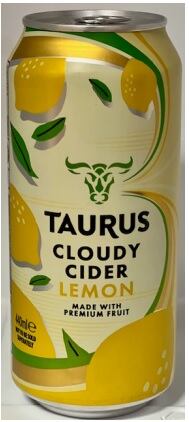Thatchers claimed that Aldi's Taurus Cider copied the appearance of Thatchers Cloudy Lemon Cider. But last week the UK High Court dismissed the case: concluding there was 'no likelihood of confusion' in the minds of consumers.
The case - which even saw the judge conduct a blind taste of the two products - has been closely watched as private label products continue to seek to gain market share.
Key elements of the case: mimicking key characteristics and consumer confusion
At the base of its case, Thatchers claimed that Aldi copied the appearance of product.
"The Somerset-based drinks manufacturer pursued a case that the discounter’s Taurus Cider infringed the intellectual property rights in its product by, essentially, mimicking key characteristics of its packaging materials," explains Fletcher.
"The main argument being that the discounter’s Taurus Cloudy Lemon Cider was unfairly taking advantage of the reputation that attaches to Thatchers’ products, which would prove detrimental to the brand. The cider maker also raised more well-known arguments relating to consumer confusion and passing off."
But Thatchers failed to convince the High Court Judge.
"The final judgment was that although there was a similar taste and appearance between the two different products, there was a ‘low degree of similarity’ and one where there was ‘no likelihood of confusion’ for consumers," continued Fletcher. "Whilst Aldi admitted it had benchmarked its product against the Thatchers cider (as is common in the industry), the Judge was unconvinced that this unfairly took advantage of Thatchers’ trade mark."

The High Court’s dismissal of Thatchers’ claim may be cause for concern for other beverage manufacturers and poses a number of questions about how best to protect and enforce Intellectual Property (IP) rights in the sector.
"Does the judgment imply that it’s difficult to defend the integrity of brands against imitation? Does the ruling provide copycats with an argument to hide behind? Whilst the Judge found in favour of Aldi on this occasion, it may not necessarily be the case in the future."
Pictured right: Taurus Cloudy Cider Lemon (Aldi). Pictured below: Thatchers Cloudy Lemon Cider.
Uncanny similarities?
Visually, the parties’ respective products had undoubted similarities, in that they incorporated lemons and leaves in packaging designs, which were presented in a similar position, as well as both using the words “Cloudy Lemon Cider”. However, the Thatchers and Taurus product names were also incorporated within the products, with Aldi’s bull icon and other unique figurative elements.
"Trade mark law sets out that the dominant and distinctive parts of trade marks and signs are considered in any similarity assessment," said Fletcher. "In this case, the Judge determined that the brand names were the dominant part, and although there was some similarity between the two, it was to a low degree.
"Any claim for consumer confusion must be assessed objectively through the eyes of the average consumer. This is a notional concept in trade mark law – essentially an individual on the shop floor rarely has the chance to make direct comparisons between trade marks, but will take into account their dominant elements. In this case, Thatchers failed to show any actual confusion between the products (which was an initial nail in the coffin), but the Judge also concluded that even if consumers may look at the Aldi product and call the Thatchers product to mind, this was insufficient."
Did Aldi ride on the coattails of Thatchers’ reputation?
The main element of Thatchers’ claim was not that consumers would be confused between its product and Aldi’s, but instead that the Taurus Cloudy Lemon Cider took unfair advantage of the reputation attached to Thatchers’ product.
"It is essentially a claim that Aldi was seeking to ride on the coattails of Thatchers’ reputation by offering a cheap alternative under similar packaging materials," said Fletcher. "Without a registered trade mark over the product itself (including packaging materials), brand owners cannot bring this claim.
"Central to an unfair advantage claim is that the marks in question must be similar and that a reputation must also attach to the registered trade mark (the Thatchers packaging materials).
"Thatchers was able to establish visual similarity between the products, and it also managed to show that it had a reputation in its trade mark (a reputation is the “attractive force which brings in custom”, essentially a strong brand identity).
"The Judge found that the average consumer would form a “link” between the two products, i.e. they would look at the Aldi product and the Thatchers Cider would be brought to mind. Two-thirds of the way through the judgment, it looked promising for Thatchers.
"What Thatchers had to finally prove was the unfair advantage element of the claim. The facts, however, did not support its case. Thatchers pleaded that Aldi deliberately departed from standard benchmarking practices, by not matching their own house style and instead opting for one which was, in Thatchers’ view, the same as the Thatchers product.
"The Judge was convinced by Aldi’s evidence that, whilst the Thatchers product helped inform the design for the discounter’s cider, cues for the respective products (lemons, leaves and similar colours) were common in the industry. Aldi’s turnover for the Taurus range of cider products also didn’t significantly increase because of its rebrand (as would usually be expected in a case of this nature) and, with the wider range of Taurus cider products in mind, the Judge found that there was no deliberate intention on the part of Aldi to take advantage of Thatchers’ reputation.
Drinking cider in a courtroom?!
A newsworthy aspect of the trial was that the Judge was requested to taste test the respective products: which she did.
"This was in support of a similar argument that if consumers were to taste Aldi’s product and consider it to be substandard, there would be detrimental consequences for Thatchers’ reputation (consumers would buy the Aldi product, dislike it, and then be put off Thatchers’ Cloudy Lemon Cider)," explained Fletcher.
"The Judge’s conclusion was that the taste did not differ significantly enough between the two brands to have such a detrimental impact on Thatchers. Therefore, Thatchers’ claim here also failed."
But what about passing off?
Thatchers also claimed that Aldi had passed its products off as being Thatchers.
"Central to a passing off claim is a requirement for a misrepresentation to take place by the defendant. In this case, Thatchers had no evidence of confusion which, although not the same, proved fatal for its passing off claim," explained Fletcher.
"Generally speaking, even if two products are similar, if they contain different and distinctive brand names, can there ever be confusion or presumed association between them? Each case is ultimately decided on its own facts, but here the facts were not supportive of Thatchers."
Protecting IP
The ultimate question for brand owners, therefore, is what they can do to protect their IP rights.
"Beverage brands that spend years of time, resource and capital building brands and innovating, may well look at this High Court dismissal with frustration," notes Fletcher. "Creating original and unique drinks that standout on supermarket shelves and in off-trade bars and fridges is more challenging than ever, and seeing a copycat product on the shopfloor is often a smack in the face to all the innovation that takes place.
"As a minimum, brand owners should protect all unique names and signs (including packaging materials) as trade marks, but also, in the case of packaging materials, as a registered design. Whilst Thatchers failed to stop Aldi on this occasion, with different factual circumstances the result may have been different.
"If brand assets are not protected to the fullest extent possible, any IP infringement claim is a non-starter."
Thatchers is not the first beverage brand to take issue with Aldi's beverages: maverick Scottish craft brewer Brewdog - behind Punk IPA - took on a Twitter war with Aldi over Aldi's 'Anti Establishment IPA'.
This dispute ended in good spirits: ALDI launched BrewDog's specially created 'ALD IPA' in its stores in 2020: with, for every case bought, both companies donating a tree to BrewDog's Forest.




